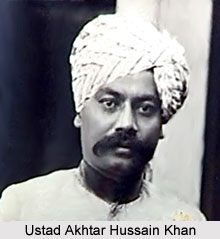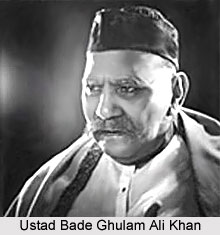 The history of Patiala Gharana dates back to 600 years but it came to limelight only in 200 years ago. It began with Ustad Jasse Khan, grand father of Mian Kale Khan and father of Ustad Ditte Khan. They sang according to the Punjabi Culture. The Khayal style was thus introduced by Ustad Mian Kalu Khan. Hence it can be said that the foundation of Patiala Gharana was laid by him.
The history of Patiala Gharana dates back to 600 years but it came to limelight only in 200 years ago. It began with Ustad Jasse Khan, grand father of Mian Kale Khan and father of Ustad Ditte Khan. They sang according to the Punjabi Culture. The Khayal style was thus introduced by Ustad Mian Kalu Khan. Hence it can be said that the foundation of Patiala Gharana was laid by him.
Main Kalu Khan became the disciple of Ustad Behram Khan Dagur of Jaipur. After some time, he got the opportunity to listen to Mian Tanras Khan who was the court musician of Bahadur Shah II. He became the disciple of Ustad Tanras Khan and received the training in Khayal singing for ten years. Later he left the Dhrupad style and took up the style of khayal singing. He then began teaching Khayal to his disciples. Sons of Ustad Mian Kalu Khan, Ustad Nabi Baksh, Ustad Ali Baksh and Ustad Fateh Ali also received training from him. His son Ali Baksh and disciple Fateh Ali proved to be god brothers. The duo became very famous. The His Majesty of Taonk State was so impressed by the gayaki of the two that he conferred the title of Karnail and Jarnail.
The eldest son Ustad Mian Jaan Khan did not have any child but the younger son, Mian Ahmad Jaan Khan had two sons, Ustad Baqar Hussain Khan and Ustad Illiyas Hussain After the partition of India Illiyas Khan settled in Pakistan. Illiyas Khan has a son Anwar Hussain Khan. Both of them are popularized the gayaki of Patiala Gharana in Pakistan. This lineage is the tradition of Ustad Nabi Baksh.
 Ustad Ali Baksh had a son, Ustad Akhtar Hussain Khan. He had three sons, Amanat Ali Khan, Fateh Ali Khan and Hamid Ali Khan. Fateh Ali had a son named Ashiq Ali Khan. He did not get married thus; this lineage could not be expanded further.
Ustad Ali Baksh had a son, Ustad Akhtar Hussain Khan. He had three sons, Amanat Ali Khan, Fateh Ali Khan and Hamid Ali Khan. Fateh Ali had a son named Ashiq Ali Khan. He did not get married thus; this lineage could not be expanded further.
Ustad Kale Khan Kasurwale and Ustad Ali Baksh Kasurwale were also the disciples of Ustad Fateh Ali. Ustad Bade Gulam Ali Khan also had been his disciple. Brothers of Ustad Bade Gulam Ali Khan, Ustad Hamid Khan and Ustad Abdul Rehman Khan also received the training in the style of the Patiala Gharana. The grandsons of Ustad Bade Gulam Ali Khan, Mazhar Ali Khan and Jawaad Ali Khan are now carrying on the tradition of this Gharana.
Ali Baksh Kasurwale and his son Ustad Bade Ghulam Ali Khan used to sing Khayal. His son Munawwar Ali Kahn followed the tradition of his father and was conferred the title of "Tan Samarat." Ustad Raza Ali Khan, the son of Ustad Munawwar Ali Kahn is carrying on the tradition of his father and two grandsons of Ustad Bade Ghulam Ali Khan, Mazhar Ali Khan and Jawaad Ali Khan are also following tradition of Patialal Gharana, Mixture of four Gharanas, the Chumukhi Gayaki of Patiala Gharana became very popular due to its devoted artists.
Patiala Gharana however gained popularity during the last two hundred years. It was during the reign of the last Mughal king Bahadur Shah II. The king and the artist of the Delhi felt unsafe there hence all the musicians fled to Punjab and took shelter in Patiala State. Raja Narender Singh was ruling the state at that time. He gave patronage to these artists. Later on many artists got training in this style which became very popular due to this uniqueness.




















